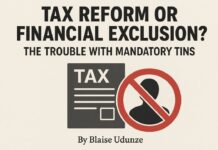by Niyi Jacobs
The tax reform bills introduced by President Bola Tinubu aim to overhaul Nigeria’s outdated tax system, bringing clarity, efficiency, and equity to the way taxes are administered and collected. With misconceptions and debates swirling around these proposals, it’s important to break them down into clear terms to understand their implications for individuals, businesses, and the economy.
The Four Tax Reform Bills
The reforms are organized into four distinct bills, each addressing a specific aspect of taxation in Nigeria:
- The Nigeria Tax Bill: This consolidates all existing tax laws into a single legislation, simplifying tax rules and ensuring consistency.
- The Nigeria Tax Administration Bill: Focused on how taxes are assessed, collected, and managed.
- The Nigeria Revenue Service Establishment Bill: Seeks to replace the Federal Inland Revenue Service (FIRS) with the Nigeria Revenue Service (NRS) for broader tax collection responsibilities.
- The Joint Revenue Board Establishment Bill: Proposes three bodies to oversee tax harmonization, dispute resolution, and taxpayer advocacy.
Key Provisions of the Nigeria Tax Bill
This bill serves as the backbone of the reform, merging various tax laws into one and repealing outdated legislation. It introduces significant changes:
- Tax Exemptions for Low-Income Earners:
Individuals earning ₦800,000 or less annually will no longer pay income tax.
Previously, these earners paid ₦84,000 annually in taxes, a substantial relief for many.
- Relief for Small Businesses:
Companies with an annual turnover of ₦50 million or less are exempted from corporate income tax.
This provision expands the definition of small businesses and offers relief to nearly 90% of Nigerian enterprises.
- Reduced Corporate Tax Rates:
Medium and large companies will see a reduction in corporate tax from 30% to 25% by 2026.
The removal of the minimum tax of 1% on gross earnings ensures only profitable companies are taxed.
- Simplified Levies:
The 2.5% education tax, 1% NITDA tax, and 0.25% NASENI tax will be replaced with a single 2% development levy.
Revenue from this levy will fund student loans from 2030, reducing the tax burden on companies.
- Progressive VAT Adjustments:
VAT will increase gradually from 7.5% to 15% by 2030.
Essential items like food, medicine, and education remain VAT-exempt, cushioning the impact on low-income households.
- Better Revenue Sharing:
States’ share of VAT revenue will rise from 50% to 55%, while the federal government’s share drops from 15% to 10%.
Key Provisions of the Nigeria Tax Administration Bill
This bill focuses on strengthening tax collection mechanisms and ensuring fairness:
- Targeting the Wealthy:
Banks must report individuals with transactions exceeding ₦25 million monthly and companies with transactions above ₦100 million to tax authorities.
- Digital Taxation:
New technologies will automate tax assessment and collection, targeting digital businesses like social media platforms and streaming services.
- Fair VAT Allocation:
VAT revenue will be attributed to the states where goods and services are consumed, rather than where company headquarters are located. This benefits smaller states and ensures equitable revenue distribution.
- Tax Refunds:
A dedicated fund for tax refunds will be created, ensuring verified claims are promptly paid.
- Decentralized Tax Collection:
Local Government Revenue Committees will handle local taxes, fines, and rates, reducing inefficiencies.
Modernizing Revenue Collection with the NRS
The Nigeria Revenue Service Establishment Bill empowers the NRS to collect taxes previously managed by agencies like the Nigeria Customs Service and NIMASA. This streamlines revenue collection and allows these agencies to focus on their core regulatory functions.
Improving Taxpayer Advocacy
The Joint Revenue Board Establishment Bill introduces:
- A National Taxpayer Database:
Harmonizes all taxpayer information for easier compliance and enforcement.
- Tax Appeal Tribunal:
Resolves disputes between taxpayers and tax authorities swiftly.
- Tax Ombudsman:
Protects taxpayers’ rights and addresses grievances against tax authorities.
How These Reforms Benefit Nigerians
The reforms are designed to ease the tax burden on low-income earners and small businesses while ensuring the wealthy and large corporations pay their fair share.
For Individuals:
Lower-income Nigerians benefit from tax exemptions and reduced VAT on essentials.
High-income earners face more scrutiny, ensuring equitable contributions.
For Businesses:
Small businesses get tax relief, enabling growth and job creation.
Medium and large companies see reduced tax rates, improving competitiveness.
For States and LGAs:
More revenue from VAT and localized tax collection boosts their ability to fund development projects.
For the Economy:
Streamlined tax laws attract foreign investments.
Automated systems reduce evasion, increasing government revenue.
Addressing Concerns Over VAT Hikes
While the gradual increase in VAT rates might raise concerns, the exemption of basic goods and services ensures the burden doesn’t disproportionately fall on the poor. Additionally, higher VAT revenues provide funds for infrastructure and social programs, creating long-term benefits.
The Path Forward
Nigeria’s tax reforms under Tinubu represent a significant shift towards fairness, efficiency, and growth. By modernizing tax laws and administration, the government aims to:
Increase compliance and revenue collection.
Promote economic growth by reducing unnecessary burdens on businesses.
Ensure a more equitable tax system where contributions align with earnings.
These reforms reflect a pro-poor, pro-growth agenda that prioritizes inclusivity and accountability. For the reforms to succeed, public education and stakeholder engagement are crucial to dispel misconceptions and build trust.
Conclusion
Tinubu’s tax reforms offer a transformative vision for Nigeria’s fiscal future. By exempting low-income earners, supporting small businesses, and holding high-income earners accountable, the reforms strike a balance between equity and efficiency. As Nigerians prepare for these changes, the focus should remain on how these measures foster economic growth, reduce inequality, and ensure sustainable development.














